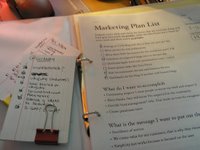Golden rules when dealing with the media
Tuesday, February 20, 2007
 Once you start to deal with the media, you need to be aware of a few golden rules:
Once you start to deal with the media, you need to be aware of a few golden rules:- Everything you say to a journalist is a matter of public record and can be referenced as part of a story unless you specifically ask to speak off the record and get the journalist to agree
- Never ask to see the story before it goes to print – the journalist may in some cases allow this, but they are not required to
- Be aware that your story may not get published in the next issue, or even at all, if a more pressing story comes in and the editor changes the layout, the journalist is under no obligation to print
- Deadline is king – ALWAYS ask a journalist when their deadline is (there is always a deadline) and make sure you get them what they need within that timescale
Labels: deadline, journalism, media, price, small business, small company, story
ATT Small Business Resources Portal
Monday, February 19, 2007
 As part of its recognition of and commitment to supporting the growth and success of its small business customers, ATT Inc. announced the introduction of a variety of resources geared to small business owners, including free advice, online courses and special offers that can all be accessed through a new Web portal at www.att.com/OnwardSmallBiz.
As part of its recognition of and commitment to supporting the growth and success of its small business customers, ATT Inc. announced the introduction of a variety of resources geared to small business owners, including free advice, online courses and special offers that can all be accessed through a new Web portal at www.att.com/OnwardSmallBiz.ATT is promoting the availability of its new online resource center for small businesses as part of a new "Onward Business"-themed integrated advertising campaign that will run in USA Today, The Wall Street Journal and select magazines which began this month, coupled with online, print and radio advertising in local markets throughout the year.
The new small business portal gives visitors the option to select topics of interest for a more personalized online experience. Content features and links on the new ATT Onward Small Biz portal include:
- A daily feed of small business news, including streaming video segments from SBTV.com — Small Business Television.
- Free instructional Web-based seminars and training courses hosted by experts.
- Tips on starting, managing and relocating a small business from a variety of experts and sources.
- Money-saving promotional offers from leading brands serving small business needs
- The ability to submit questions and to receive one-on-one advice from SCORE — Counselors to America’s Small Business.
- Information on ATT products and services, money-saving bundles and special offers for small business are also available on the portal.
- Easy access to ATT’s online support, e-bill and account management services.
Labels: att, att onward small biz portal, money saving, portal, small business, small business resources, smb, start-up, tips
Plan the Vital Q4
Tuesday, October 17, 2006
 Very interesting article run by MSNBC:
Very interesting article run by MSNBC: The fourth quarter is arguably the most important time of the year for a small business owners — it’s when they should be doing year-end tax planning and looking ahead to 2007. Capital spending, hiring plans and employee compensation
should all be items on the agenda.
There can be a heavy price, and not just in taxes, to be paid early in the new year, if you haven’t looked at your books and thought about how your company is likely to fare for the rest of 2006 and into early next year.
Now is the time to be thinking about capital spending. Many owners are anxious to take advantage of what’s known as the Section 179 deduction, which allows a small business to deduct up front rather than depreciate over time the cost of certain kinds of equipment bought and put into service during the tax year.
Labels: capital, capital spending, deduction, planning, price, q4, tax
Tips for a Successfull Start-Up
Friday, October 13, 2006
 Here are eight guidelines you'll want to follow to help you make sure the business you're starting or buying has a fighting chance to survive -- for both the short and long term:
Here are eight guidelines you'll want to follow to help you make sure the business you're starting or buying has a fighting chance to survive -- for both the short and long term:1. Find something you'll enjoy daily. It's important that you enjoy both what your company does and what running the company entails.
2. Don't start if you can't ensure a solid profit margin. Make sure your business will have a solid profit margin, which is vital to long-term success.
3. If it's your first business, think about buying an existing business or a franchise. Your first business will always be the toughest because you have so much to learn. An existing business or franchise provides a shortcut through much of that process.
4. Buy into a growing industry and market. Remember, you're building your business for the long term, so think about how your company will evolve over a 10-year period. You want to have a good sense that there'll still be a demand for your product or service 10 years out.
5. Marketing and selling to new customers is expensive. Repeat business is where the profit is in just about every venture. Make sure you have it.
6. Keep recurring costs to a minimum. There'll be times when you're first starting out that you'll have slow cashflow. Don't cripple yourself by committing to expenses years in advance.
7. Get good advice. Work with the best and learn from these mentors. Don't just get them to do a job for you -- learn why they do what they do so you gain knowledge in their field.
8. Be prepared to work really hard for the first year or two. Strong sales, effective marketing and nonstop networking all are vital to building a solid cashflow and profit. At times, you'll probably feel like it's too hard and you'll want to give up, but if you stick with it, things will get easier.
via
10 Mistakes Entrepreneurs Should Avoid
Thursday, October 12, 2006
 Continuing the lists of mistakes that should be avoided by any entrepreneur, Paul Lemberg of BusinessCoach put up a list of another 10 entrepreneurial mistakes:
Continuing the lists of mistakes that should be avoided by any entrepreneur, Paul Lemberg of BusinessCoach put up a list of another 10 entrepreneurial mistakes:1. Big Customer Syndrome
If more than 50 percent of your revenues come from any one customer you may be headed for a meltdown. Always look for new business. And always seek to diversify your revenue sources.
2. Creating products in a vacuum.
Do not be a product searching for a market. Do the "market research" up front. Test the idea. Talk to potential customers, at least a dozen of them. Find out if anyone wants to buy it. Do this before anything else.
3. Equal partnerships
Suppose you and your new partner split the company 50/50. That seems fine and fair right now, but as your personal and professional interests diverge, it is a sure recipe for disaster. Either party's veto power can stall the growth and development of your company. 51/49 works much better than 50/50.
4. Low prices
Set your prices as high as your market will bear. Even if you can sell more units and generate greater dollar volume at the lower price (which is not always the case) you may not be better off. Make sure you do all the math before you decide on a low price strategy. Figure all your incremental costs. Figure in the extra stress as well.
5. Not enough capital
Be conservative in all your projections. Make sure you have at least as much capital as you need to make it through the sales cycle, or until the next planned round of funding. Or lower your burn rate so that you do.
6. Out of Focus
Concentrating your attention in a limited area leads to better-than-average results, almost always surpassing the profits generated from diversification. Al Reis, of Positioning fame, wrote a book that covers just this subject. It's called Focus.
7. First class and infrastructure crazy
The best entrepreneurs know how to stretch their cash and use it for key business-building processes like product development, sales and marketing. Spend all the money really necessary to achieve your objectives.
8. Perfection-itis
Focus on creating a market-beating product within the allotted time. Set a deadline and build a product development plan to match. Know when you have to stop development to make a delivery date. When your time's up, it's up. Release your product.
9. No clear return on investment
Do the analysis. Talk to your customers, create case studies. Come up with ways to quantify the benefits. If you can't justify the purchase, don't expect your customer will. If you can demonstrate the great return on investment your product provides, sales are a slam dunk.
10. Not admitting your mistakes.
OK, everybody makes mistakes. Just try to catch them quickly, before they kill your company. To avoid some mistakes in the future, it sometimes helps to ask good questions ahead of time. Click the link if you would like a copy of my fractal strategic planning questionnaire.
via photo
8 Business Plan Mistakes to Avoid
 While including the necessary items in a business plan is important, you also want to make sure you don't commit any of the following common business plan mistakes:
While including the necessary items in a business plan is important, you also want to make sure you don't commit any of the following common business plan mistakes:Putting it off. Too many businesses make business plans only when they have no choice in the matter. Unless the bank or the investors want a plan, there is no plan.
Cash flow casualness. Most people think in terms of profits instead of cash. Understanding cash flow is critical. If you have only one table in your business plan, make it the cash flow table.
Idea inflation. Don't overestimate the importance of the idea.Plans don't sell new business ideas to investors. People do. Investors invest in people, not ideas.
Fear and dread. Doing a business plan isn't as hard as you might think. You don't have to write a doctoral thesis or a novel.
Spongy, vague goals. Leave out the vague and the meaningless babble of business phrases (such as "being the best") because they are simply hype. Remember that the objective of a plan is its results, and for results, you need tracking and follow up.
One size fits all. Tailor your plan to its real business purpose. Business plans can be different things: they are often just sales documents to sell an idea for a new business.
Diluted priorities. nRemember, strategy is focus. A priority list with 3-4 items is focus. A priority list with 20 items is certainly not strategic, and rarely if ever effective.
Hockey-stick shaped growth projections. Sales grow slowly at first, but then shoot up boldly with huge growth rates, as soon as 'something' happens. Have projections that are conservative so you can defend them.
via. photo.
Labels: business plan, goals, idea, mistakes, planning, sales
10 Steps Every Business Owner Must Follow
Tuesday, October 10, 2006
 Stephen James considers that if you take action in each of these 10 areas, you will not only be 2 steps in front of your competition, but you may very well be within touching distance of living your dream.
Stephen James considers that if you take action in each of these 10 areas, you will not only be 2 steps in front of your competition, but you may very well be within touching distance of living your dream.1. Business Plan. A business plan is critical to achieving consistent growth in any business. The benefits of a business plan are realised immediately through the process of just thinking clearly about your business for an extended period of time, and through illuminating the areas of your business that need fixing.
2. Customer Database. At the end of the day, your customers are the most valuable asset you have in your business. You should be taking every opportunity to collect the names and contact details of your customers and communicating with them on a regular basis.
3. Systems. Systems are essential for ensuring that you provide a consistent level of service to your customers and so that you understand the financial performance of your business.
4. Staff Incentives. To attract great people, progressive companies are keenly aware that they need to foster personal responsibility and provide direct reward for measurable results.
5. Staff meetings. Meetings are an opportunity to inspire your people and thereby your business. They also give your people a sense of belonging through the process of sharing information.
6. Marketing. Marketing is the most important of all success strategies in your business, because if you can't find a buyer for your product or service, nothing else you do will matter!
7. Branding. Branding is about creating and communicating a set of values to the consumer of your product or service.
8. Business Image. First impressions count for a lot. Addressing your business image is all about paying attention to the little things that will exceed your customers expectations.
9. Guarantee. How does a customer truly believe they are going to receive value from doing business with you? They will only know this if you are prepared to take more risk in the transaction than they are…and this promise is delivered through your guarantee.
10. Customer care. Every business should have a follow up system that extends sincere thanks to every new customer and for their ongoing patronage.
via photo
Labels: branding, business plan, clients, customers, marketing, staff, strategy
3 Steps to Take Before You Setup Your Small Business Marketing Strategy

Along with your business plan, your small business marketing plan is one of the most important long-term plans you'll make for your small business.
Brandt Stoht, from the smallbusinessmktng.com has three steps to setup your small business marketing strategy:
1. Know your market
Ask yourself: Who are my customers? Once you've identified who they are, ask yourself: What are my customers' problems? What are their dreams and aspirations? The surest way to answer those 3questions, of course, is to ask your customers themselves.
2. Know yourself
Ask yourself: What does my business do? How is my business different than my competitors? How does my business help solve my customers' problems or help them achieve their dreams? Brandt Stohr advises answering these questions will help you to define your unique selling proposition those aspects that set you apart from your competitors.
3. Analyze your competitors' small business marketing strategies
First, look at your competitors' small business marketing strategies. Are there obvious gaps that you could fill (and thereby stand out among the competition)? For example, if you see that none of your competitors have websites, you could stand out with a small business marketing strategy online.
Brandt Stoht, from the smallbusinessmktng.com has three steps to setup your small business marketing strategy:
1. Know your market
Ask yourself: Who are my customers? Once you've identified who they are, ask yourself: What are my customers' problems? What are their dreams and aspirations? The surest way to answer those 3questions, of course, is to ask your customers themselves.
2. Know yourself
Ask yourself: What does my business do? How is my business different than my competitors? How does my business help solve my customers' problems or help them achieve their dreams? Brandt Stohr advises answering these questions will help you to define your unique selling proposition those aspects that set you apart from your competitors.
3. Analyze your competitors' small business marketing strategies
First, look at your competitors' small business marketing strategies. Are there obvious gaps that you could fill (and thereby stand out among the competition)? For example, if you see that none of your competitors have websites, you could stand out with a small business marketing strategy online.
Labels: marketing, marketing strategy, small business, unique selling proposition
Top Home-Based Business Trends in 2007
Monday, October 09, 2006
Homestead Technologies commissioned the findings researched by Darrell Zahorsky, small business expert for About.com and author of upcoming book, "1001 Small Innovations," to encourage the growing numbers of workers seeking greater work-life balance and wealth-building opportunities in recognition of "Home-Based Business Week"
Here is the list of the top ten home based businesses for 2007:
Scrap Booking: In today's easy to save and store digital age, opportunities abound for the home-based scrapbook artist, workshop teacher, or a direct sales rep.
via
Here is the list of the top ten home based businesses for 2007:
- E-Learning: With advances in new web application tools such as podcasts and video blogs, development costs will decrease.
- E-Bay Aftermarket: Helping companies conduct market research, pricing strategies, shipping, and competitive analysis is a great niche business.
- Children Arts Education: There is a major market for teachers of right-brained education who are thought to help foster the development of future innovators.
- Garage Organizers: Just as organizing closets was the next big thing in the 80's, the messy garage is the final space to clean up.
- Background Checks: Small businesses with limited resources are turning to background check companies to handle investigation and due diligence.
- Pet Sitting: An ideal home-based business where you get paid to walk and enjoy the companionship of pets.
- Specialized Coaching: The coaching market has boomed in the recent years including specialized areas such as life, spiritual, corporate, relationship and business.
- Home-based Debt Collection: Debt has become a way of life for many Americans. Operating a low overhead home-based collection service can serve the niche sections of this market.
- Specialized Outsourcing: The small business market has limited resources and a focus on core competencies. Specialized outsourcing from home to small business will have a solid position market position for years to come.
via
Labels: home business, small business, trends
4 Marketing Attitudes to Avoid
C.J. Hayden, Contributing Editor for RainToday.com and author of Get Clients Now!: A 28-day Marketing Program for Professionals, Consultants, And Coaches has come up with a list of 3 common marketing attitudes to avoid:
Read full article here. Via
1. "I shouldn't have to market."
If you perceive marketing as a dirty business, try thinking of it as the diapers you need to change in order to have the joys of being a parent. But instead of focusing on what you dislike, tie your marketing chores to your vision of a successful business.2. "I don't have time for marketing."
Whether your responsibilities preventing you from marketing are within the business or outside it, you need to allocate a minimum amount of time each week, no matter what. Even two hours per week can make a significant difference, if you consistently use that time for marketing.3. "I don't want to bug people."
Consistent and persistent follow-up isn't bugging people – it's the mark of a true professional. You want to convince your prospects that you are hard-working and reliable, and that you truly care about helping them solve their problems. If they hear from you more than once that you would really like to be of service to them and are available to help, you will build their trust, not their annoyance.4. "My marketing isn't working."
So how many prospects do you need to make contact with for just one to be interested in a presentation? Ten, maybe? That means you need to make contact with 60 prospects each month in order to land your two new clients. If you do this math for yourself, you may quickly find that the only thing wrong with your marketing is that there hasn't been enough of itRead full article here. Via
Labels: attitude, marketing, marketing strategy